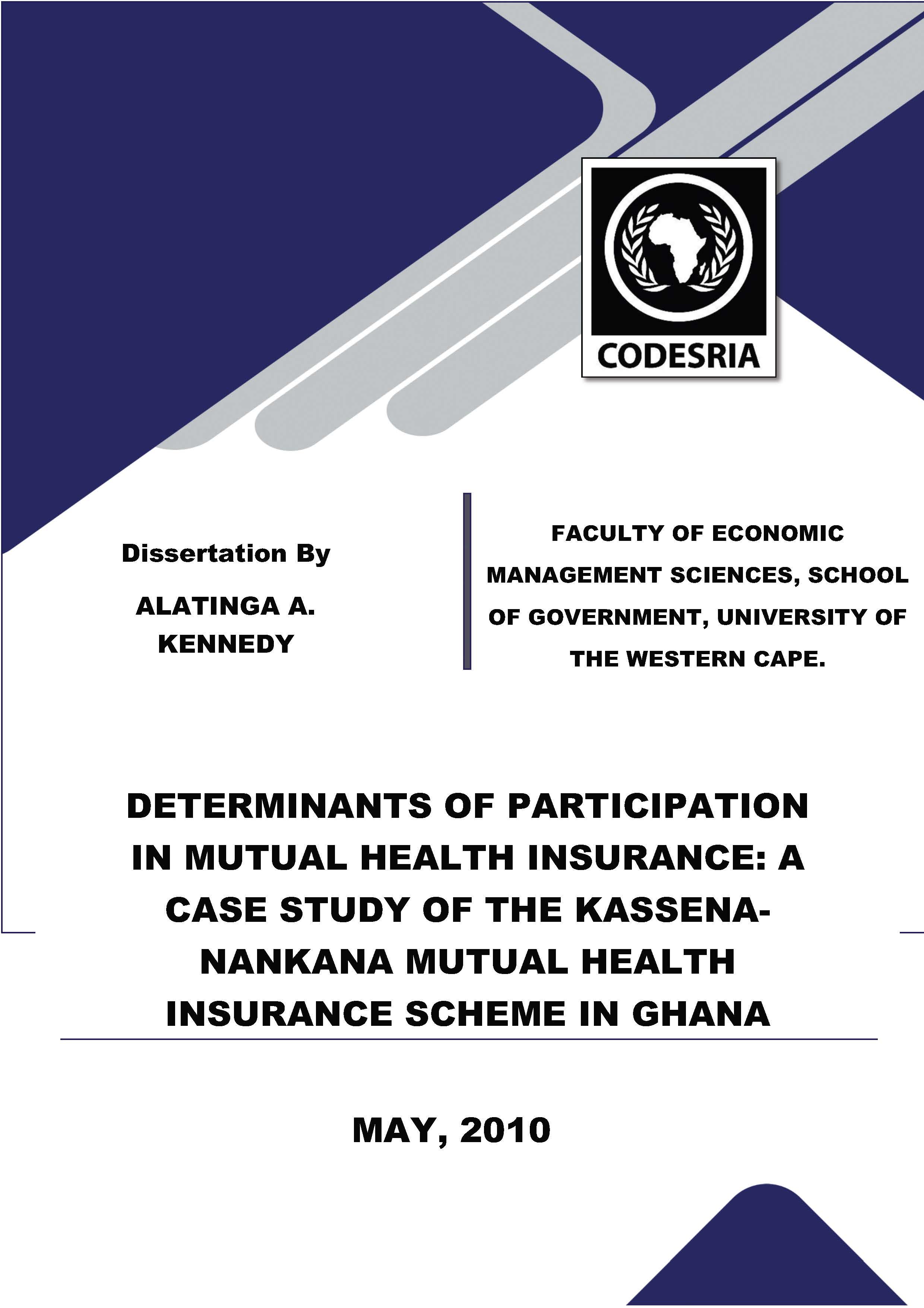DETERMINANTS OF PARTICIPATION IN MUTUAL HEALTH INSURANCE: A CASE STUDY OF THE KASSENANANKANA MUTUAL HEALTH INSURANCE SCHEME IN GHANA
Keywords:
MUTUAL HEALTH INSURANCE, KASSENANANKANA MUTUAL HEALTH, GHANASynopsis
Health security is increasingly being seen as integral to any poverty reduction strategy. Health is viewed not only as an “end” in itself but also as an indispensable “input” into the development process because there is a positive link between health and development. Of all the risks facing poor households, health risks probably pose the greatest threat to their lives and livelihoods. Against this background, this research examines the vital subject of participation in mutual health insurance as a poverty reduction strategy at the rural community level. It has been accepted that community-based initiatives play important roles in improving poor people’s risk-sharing arrangements. The extent to which these community-based initiatives are able to address the problem of social exclusion in local communities is far from being clear. Using household survey data and focus group discussions from two rural communities in Northern Ghana together with Principal Components Analysis (PCA), I compared mutual health insurance scheme (MHIS) members and non-members to find out the factors that determine households or individual participation in health insurance and their respective access to health care because many studies
on health financing schemes at the community level have often glossed over the determinants of participation in such schemes. The findings indicate strongly that income and socio- economic status are the major determinants of participation in MHIS. However, the participation of the poorest of the poor is not automatic in the MHIS as they cannot afford the insurance premiums. Those who are “better off” are 28 times more likely to participate in MHIS than the poorest in society. Making the payment of insurance premiums flexible may enhance the inclusion of the poor in the MHIS.
Downloads
References
Bourdieu, Pierre. (1985), The Forms of Capital, in Handbook of Theory and Research for the Sociology of Education. J.G. Richardson (Editor), Greenwood Press: New York. Bowling, Ann. (2004), Research Methods in Health. Investigating health and health services. Second Edition.
McGraw-Hill Education. Berkshire. SL6 2QL. Open University Press: United Kingdom.
Bryman, Alan. (2008), Social Research Methods. Third Edition. Great Clarendon Street, Oxford OX2 6DP. Oxford University Press.
Churchill, Craig. (2006), Protecting the Poor. A micro insurance compendium. International Labour
Organisation: CH-1211 Geneva, Switzerland.
Cichon et al. (2004), Quantitative Methods in Social Protection Series: Financing Social Protection. International labour Organisation and International Social Security Association.
Friedmann, John. (1992) Empowerment -The Politics of Alternative Development. Cambridge: Blackwell
Publishers.
Gottret, Pablo and Schieber, George. (2006), Health Financing Revisited: A practitioner’s Guide. 1818 H Street NW. Washington DC 20433: The World Bank.
Hsiao, C. William and Shaw R. Paul. (2007), Social Health Insurance for Developing Nations. WBI Development Studies. Paper. 1818 H Street, NW. Washington, DC 20433. The World Bank.
Jütting, P Johannes. (2005), Health Insurance for the Poor in developing Countries. Croft Road, Aldershot. Hampshire GU113HR, England: Ashgate Publishing Limited, Gower House.
Kennedy, Valerie. (2000), Edward Said. A Critical Introduction. 65 Bridge Street, Cambridge CB2 1UR, UK: Polity Press.
Midgley et al., (1986) cited in Crook and Jerve (1991, 35). Government and Participation: Institutional Development, Decentralisation and Democracy in the Third World. Michelson Institute, Bergen
Mounton J. (2001), How to succeeded in your Master’s and Doctorial Studies. Pretoria.Van Schaik Publishers






